Fleurs du Mal Magazine


Or see the index

Thomas Traherne
(1637 – 1674)
Innocence
But that which most I wonder at, which most
I did esteem my bliss, which most I boast,
And ever shall enjoy, is that within
I felt no stain, nor spot of sin.
No darkness then did overshade,
But all within was pure and bright,
No guilt did crush, nor fear invade
But all my soul was full of light.
A joyful sense and purity
Is all I can remember;
The very night to me was bright,
‘Twas summer in December.
A serious meditation did employ
My soul within, which taken up with joy
Did seem no outward thing to note, but fly
All objects that do feed the eye.
While it those very objects did
Admire, and prize, and praise, and love,
Which in their glory most are hid,
Which presence only doth remove.
Their constant daily presence I
Rejoicing at, did see;
And that which takes them from the eye
Of others, offer’d them to me.
No inward inclination did I feel
To avarice or pride: my soul did kneel
In admiration all the day. No lust, nor strife,
Polluted then my infant life.
No fraud nor anger in me mov’d,
No malice, jealousy, or spite;
All that I saw I truly lov’d.
Contentment only and delight
Were in my soul. O Heav’n! what bliss
Did I enjoy and feel!
What powerful delight did this
Inspire! for this I daily kneel.
Whether it be that nature is so pure,
And custom only vicious; or that sure
God did by miracle the guilt remove,
And make my soul to feel his love
So early: or that ’twas one day,
Wherein this happiness I found;
Whose strength and brightness so do ray,
That still it seems me to surround;
What ere it is, it is a light
So endless unto me
That I a world of true delight
Did then and to this day do see.
That prospect was the gate of Heav’n, that day
The ancient light of Eden did convey
Into my soul: I was an Adam there
A little Adam in a sphere
Of joys! O there my ravish’d sense
Was entertain’d in Paradise,
And had a sight of innocence
Which was beyond all bound and price.
An antepast of Heaven sure!
I on the earth did reign;
Within, without me, all was pure;
I must become a child again.
Thomas Traherne
fleursdumal.nl magazine
More in: Archive S-T, Archive S-T, CLASSIC POETRY

Sibylla Schwarz
Sonnet
(Daphne aus der Schäfererzählung: Faunus)
Hier hab ich nun mein sehnliches Verlangen:
hier liegt mein Lieb, hier ligt mein ander ich:
hier giebt das Glück sich selbst gefangen mich:
hier mag ich nun mein Lieb vielmahl umfangen:
hier mag ich nun auch küssen seine Wangen:
Cupido hört mein Klagen inniglich,
und wil nun auch so hülffreich zeigen sich;
Nun mag ich wohl mit meinem Glücke prangen;
die Venus zeigt mir iezt ein guhtes Ziel,
ich wil nur selbst, nicht was ich gerne wil;
O Blödigkeit, du must nur von mir weichen!
weil du hir bist, wärt meine grosse Pein;
Wer lieben wil, mus nicht so blöde seyn,
sonst kan er nicht der Liebe Lohn erreichen.
Sibylla Schwarz (1621 – 1638)
Gedicht: Sonnet
(Daphne aus der Schäfererzählung: Faunus)
(Blödigkeit bedeutet Schüchternheit)
fleursdumal.nl magazine
More in: Archive S-T, SIbylla Schwarz

Sibylla Schwarz
Auß dem Lied vohn der beständigen Liebe
Wol dem, der also ist verliebet,
daß seine Liebe nimmer weicht!
Wer sich der Wanckelmuht ergiebet,
der ist eß, der dem Mond sich gleicht.
Der Neidt, der sonst die Liebe bricht,
der bricht doch meine Liebe nicht.
Soll mich dan nuhn der Neidt betrügen,
mich der kein Tod abschrecken kan?
soll mich die Welt mit ihrem Liegen
izt führen eine frembde Bahn?
Der Neidt, der sonst die Liebe bricht,
der bricht doch meine Liebe nicht.
Das ist eß, das wir armen klagen:
Wan einer sich ein Ziel erkießt,
so bald wil ihn der Neidt verjagen,
der aller Liebe Schewsahl ist:
Der Neid der sonst die Liebe bricht,
der bricht doch meine Liebe nicht.
Will nuhn der Neid das Brodt mir nehmen,
und denckt mich damit abzuziehn,
was will ich mich doch darümb grähmen,
die Lieb ernehrt mich immer hin;
Der Neidt der sonst die Liebe bricht,
der bricht doch meine Liebe nicht.
Will mich der Neidt in grünen Zeiten,
da meine Jugend Blumen trägt,
schon in Verzweiflungs Banden leiten,
eh ich mit Reiff und Schnee bedeckt?
Der Neidt, der sonst die Liebe bricht,
der bricht doch meine Liebe nicht.
Bin ich der ärmste zwahr im Lande,
bin ich zwahr der, dem Geld gebricht,
so nehm ich Armuht für die Schande,
die Armuht tuht der Liebe nicht:
der Neid, der sonst die Liebe bricht,
der bricht doch meine Liebe nicht.
Wan mir nuhr gibt mein Liecht, mein Leben
die Hand voll Lieb und trewer Gunst,
wil ich doch nicht dis kleine geben
ümb aller Welt Gelt, Guht und Kunst:
der Neidt, der sonst die Liebe bricht,
der bricht doch meine Liebe nicht.
Hiemit wil ich die Seuffzer enden;
Gelück, ich geb dir guhte Nacht
du magst dich links und rechts ümbwenden,
Ich bin der, der des Glückes lacht,
und vohn der Liebe lass ich nicht,
biß daß der Tod sie selber bricht.
Sibylla Schwarz (1621 – 1638)
Gedicht: Auß dem Lied vohn der beständigen Liebe
fleursdumal.nl magazine
More in: Archive S-T, SIbylla Schwarz
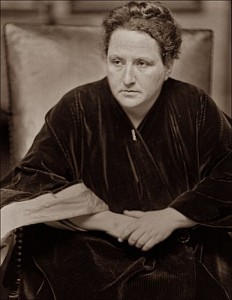
Gertrude Stein
(1874-1946)
Daughter
Why is the world at peace.
This may astonish you a little but when you realise how
easily Mrs. Charles Bianco sells the work of American
painters to American millionaires you will recognize that
authorities are constrained to be relieved. Let me tell you a
story. A painter loved a woman. A musician did not sing.
A South African loved books. An American was a woman
and needed help. Are Americans the same as incubators.
But this is the rest of the story. He became an authority.
Gertrude Stein poetry
fleursdumal.nl magazine
More in: Archive S-T, Stein, Gertrude
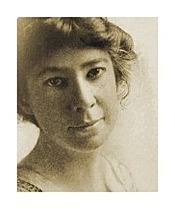
Sara Teasdale
(1884 – 1933)
“Only in Sleep”
Only in sleep I see their faces,
Children I played with when I was a child,
Louise comes back with her brown hair braided,
Annie with ringlets warm and wild.
Only in sleep Time is forgotten—
What may have come to them, who can know?
Yet we played last night as long ago,
And the doll-house stood at the turn of the stair.
The years had not sharpened their smooth round faces,
I met their eyes and found them mild—
Do they, too, dream of me, I wonder,
And for them am I too a child?
Sara Teasdale
fleursdumal.nl magazine
More in: Archive S-T, Teasdale, Sara

Gertrude Stein
Cézanne
The Irish lady can say, that to-day is every day. Caesar can say that
every day is to-day and they say that every day is as they say.
In this way we have a place to stay and he was not met because
he was settled to stay. When I said settled I meant settled to stay.
When I said settled to stay I meant settled to stay Saturday. In this
way a mouth is a mouth. In this way if in as a mouth if in as a
mouth where, if in as a mouth where and there. Believe they have
water too. Believe they have that water too and blue when you see
blue, is all blue precious too, is all that that is precious too is all
that and they meant to absolve you. In this way Cézanne nearly did
nearly in this way. Cézanne nearly did nearly did and nearly did.
And was I surprised. Was I very surprised. Was I surprised. I was
surprised and in that patient, are you patient when you find bees.
Bees in a garden make a specialty of honey and so does honey. Honey
and prayer. Honey and there. There where the grass can grow nearly
four times yearly.
Gertrude Stein (1874-1946) poetry
fleursdumal.nl magazine
More in: Archive S-T, Stein, Gertrude

William Shakespeare
(1564-1616)
Lowliness
Lowliness is young ambition’s ladder,
Whereto the climber-upward turns his face;
But when he once attains the upmost round,
He then unto the ladder turns his back,
Looks in the clouds, scorning the base degrees
By which he did ascend
William Shakespeare, Julius Caesar, Act II, sc.1
Shakespeare 400 (1616 – 2016)
fleursdumal.nl magazine
More in: Archive S-T, Shakespeare, William
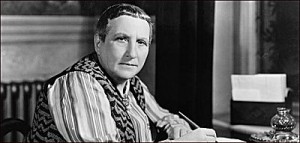
Gertrude Stein
(1874-1946)
A Mounted Umbrella
What was the use of not leaving it there where it would hang what was the use if there was no chance of ever seeing it come there and show that it was handsome and right in the way it showed it. The lesson is to learn that it does show it, that it shows it and that nothing, that there is nothing, that there is no more to do about it and just so much more is there plenty of reason for making an exchange.
Gertrude Stein: A mounted umbrella
fleursdumal.nl magazine
More in: Archive S-T, Stein, Gertrude
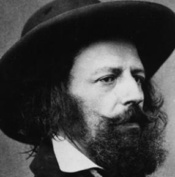
Alfred Lord Tennyson
(1809 – 1892)
Beauty
Oh, Beauty, passing beauty! sweetest Sweet!
How canst thou let me waste my youth in sighs;
I only ask to sit beside thy feet.
Thou knowest I dare not look into thine eyes,
Might I but kiss thy hand! I dare not fold
My arms about thee—scarcely dare to speak.
And nothing seems to me so wild and bold,
As with one kiss to touch thy blessèd cheek.
Methinks if I should kiss thee, no control
Within the thrilling brain could keep afloat
The subtle spirit. Even while I spoke,
The bare word KISS hath made my inner soul
To tremble like a lutestring, ere the note
Hath melted in the silence that it broke.
Alfred Lord Tennyson
fleursdumal.nl magazine
More in: Archive S-T, Tennyson, Alfred Lord

Thomas Traherne
(1637 – 1674)
Walking
To walk abroad is, not with eyes,
But thoughts, the fields to see and prize;
Else may the silent feet,
Like logs of wood,
Move up and down, and see no good
Nor joy nor glory meet.
Ev’n carts and wheels their place do change,
But cannot see, though very strange
The glory that is by;
Dead puppets may
Move in the bright and glorious day,
Yet not behold the sky.
And are not men than they more blind,
Who having eyes yet never find
The bliss in which they move;
Like statues dead
They up and down are carried
Yet never see nor love.
To walk is by a thought to go;
To move in spirit to and fro;
To mind the good we see;
To taste the sweet;
Observing all the things we meet
How choice and rich they be.
To note the beauty of the day,
And golden fields of corn survey;
Admire each pretty flow’r
With its sweet smell;
To praise their Maker, and to tell
The marks of his great pow’r.
To fly abroad like active bees,
Among the hedges and the trees,
To cull the dew that lies
On ev’ry blade,
From ev’ry blossom; till we lade
Our minds, as they their thighs.
Observe those rich and glorious things,
The rivers, meadows, woods, and springs,
The fructifying sun;
To note from far
The rising of each twinkling star
For us his race to run.
A little child these well perceives,
Who, tumbling in green grass and leaves,
May rich as kings be thought,
But there’s a sight
Which perfect manhood may delight,
To which we shall be brought.
While in those pleasant paths we talk,
‘Tis that tow’rds which at last we walk;
For we may by degrees
Wisely proceed
Pleasures of love and praise to heed,
From viewing herbs and trees.
Thomas Traherne
fleursdumal.nl magazine
More in: Archive S-T, CLASSIC POETRY

William Shakespeare
(1564-1616)
To be, or not to be
To be, or not to be: that is the question:
Whether ’tis nobler in the mind to suffer
The slings and arrows of outrageous fortune,
Or to take arms against a sea of troubles,
And by opposing end them? To die: to sleep:
No more; and by a sleep to say we end
The heartache and the thousand natural shocks
That flesh is heir to,–‘t is a consummation
Devoutly to be wish’d. To die, to sleep;
To sleep: perchance to dream: ay, there’s the rub:
For in that sleep of death what dreams may come,
When we have shuffled off this mortal coil,
Must give us pause: there’s the respect
That makes calamity of so long life;
For who would bear the whips and scorns of time,
The oppressor’s wrong, the proud man’s contumely,
The pangs of despised love, the law’s delay,
The insolence of office and the spurns
That patient merit of the unworthy takes,
When he himself might his quietus make
With a bare bodkin? who would fardels bear,
To grunt and sweat under a weary life,
But that the dread of something after death,
The undiscover’d country from whose bourn
No traveller returns, puzzles the will
And makes us rather bear those ills we have
Than fly to others that we know not of?
Thus conscience does make cowards of us all;
And thus the native hue of resolution
Is sicklied o’er with the pale cast of thought,
And enterprises of great pith and moment
With this regard their currents turn awry,
And lose the name of action.
William Shakespeare, “Hamlet”, Act 3 scene 1
Shakespeare 400 (1616 – 2016)
fleursdumal.nl magazine
More in: Archive S-T, Shakespeare, William
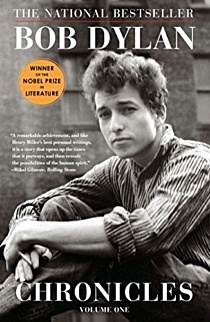
Bob Dylan won the Nobel Prize in Literature 2016
Bob Dylan born: 24 May 1941, Duluth, MN, USA – Nobel Prize motivation: “for having created new poetic expressions within the great American song tradition” – Bob Dylan (not present at the ceremony) writes Nobel prize speech & Patti Smith will perform Dylan’s “A Hard Rain’s A-Gonna Fall” on the Nobel banquet on Dec 10, 2016
Bob Dylan’s Albums
Bob Dylan (1962)
The Freewheelin’ Bob Dylan (1963)
The Times They Are A-Changin’ (1964)
Another Side Of Bob Dylan (1964)
Bringing It All Back Home (1965)
Highway 61 Revisited (1965)
Blonde On Blonde (1966)
Bob Dylan’s Greatest Hits (1967)
John Wesley Harding (1968)
Nashville Skyline (1969)
Self Portrait (1970)
New Morning (1970)
Bob Dylan’s Greatest Hits Vol. 2 (1971)
Pat Garrett & Billy The Kid (1973)
Dylan (1973)
Planet Waves (1974)
Before The Flood (1974)
Blood On The Tracks (1975)
The Basement Tapes (1975)
Desire (1976)
Hard Rain (1976)
Street Legal (1978)
Bob Dylan At Budokan (1978)
Slow Train Coming (1979)
Saved (1980)
Shot Of Love (1981)
Infidels (1983)
Real Live (1984)
Empire Burlesque (1985)
Biograph (1985)
Knocked Out Loaded (1986)
Down In The Groove (1988)
Dylan & The Dead (1989)
Oh Mercy (1989)
Under The Red Sky (1990)
The Bootleg Series Vols. 1-3: Rare And Unreleased 1961-1991 (1991)
Good As I Been to You (1992)
World Gone Wrong (1993)
Bob Dylan’s Greatest Hits Vol. 3 (1994)
MTV Unplugged (1995)
The Best Of Bob Dylan (1997)
The Songs Of Jimmie Rodgers: A Tribute (1997)
Time Out Of Mind (1997)
The Bootleg Series, Vol. 4: Bob Dylan Live 1966: The ’Royal Albert Hall’ Concert (1998)
The Essential Bob Dylan (2000)
”Love And Theft” (2001)
The Bootleg Series, Vol. 5: Live 1975: The Rolling Thunder Revue (2002)
Masked And Anonymous: The Soundtrack (2003)
Gotta Serve Somebody: The Gospel Songs Of Bob Dylan (2003)
The Bootleg Series, Vol. 6: Live 1964: Concert At Philharmonic Hall (2004)
The Bootleg Series, Vol. 7: No Direction Home: The Soundtrack (2005)
Live At The Gaslight 1962 (2005)
Live At Carnegie Hall 1963 (2005)
Modern Times (2006)
The Traveling Wilburys Collection (2007)
The Bootleg Series, Vol. 8: Tell Tale Signs: Rare And Unreleased, 1989-2006 (2008)
Together Through Life (2009)
Christmas In The Heart (2009)
The Original Mono Recordings (2010)
The Bootleg Series, Vol. 9: The Witmark Demos: 1962-1964 (2010)
Good Rockin’ Tonight: The Legacy Of Sun (2011)
Timeless (2011)
Tempest (2012)
The Lost Notebooks Of Hank Williams (2011)
The Bootleg Series, Vol. 10: Another Self Portrait (2013)
The Bootleg Series, Vol. 11: The Basement Tapes Complete (2014)
The Bootleg Series, Vol. 12: The Cutting Edge 1965-1966 (2015)
Shadows In The Night (2015)
Fallen Angels (2016)
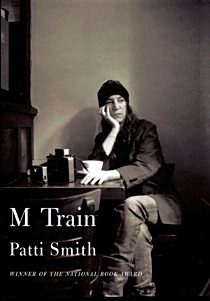 Nobel Prizes in Literature since 2000
Nobel Prizes in Literature since 2000
2016, Bob Dylan “for having created new poetic expressions within the great American song tradition”
2015, Svetlana Alexievich “for her polyphonic writings, a monument to suffering and courage in our time”
2014, Patrick Modiano “for the art of memory with which he has evoked the most ungraspable human destinies and uncovered the life-world of the occupation”
2013, Alice Munro “master of the contemporary short story”
2012, Mo Yan “who with hallucinatory realism merges folk tales, history and the contemporary”
2011, Tomas Tranströmer “because, through his condensed, translucent images, he gives us fresh access to reality”
2010, Mario Vargas Llosa “for his cartography of structures of power and his trenchant images of the individual’s resistance, revolt, and defeat”
2009, Herta Müller “who, with the concentration of poetry and the frankness of prose, depicts the landscape of the dispossessed”
2008, Jean-Marie Gustave Le Clézio “author of new departures, poetic adventure and sensual ecstasy, explorer of a humanity beyond and below the reigning civilization”
2007, Doris Lessing “that epicist of the female experience, who with scepticism, fire and visionary power has subjected a divided civilisation to scrutiny”
2006, Orhan Pamuk “who in the quest for the melancholic soul of his native city has discovered new symbols for the clash and interlacing of cultures”
2005, Harold Pinter “who in his plays uncovers the precipice under everyday prattle and forces entry into oppression’s closed rooms”
2004, Elfriede Jelinek “for her musical flow of voices and counter-voices in novels and plays that with extraordinary linguistic zeal reveal the absurdity of society’s clichés and their subjugating power”
2003, John M. Coetzee “who in innumerable guises portrays the surprising involvement of the outsider”
2002, Imre Kertész “for writing that upholds the fragile experience of the individual against the barbaric arbitrariness of history”
2001, Sir Vidiadhar Surajprasad Naipaul “for having united perceptive narrative and incorruptible scrutiny in works that compel us to see the presence of suppressed histories”
2000, Gao Xingjian “for an æuvre of universal validity, bitter insights and linguistic ingenuity, which has opened new paths for the Chinese novel and drama”
fleursdumal.nl magazine
More in: #Archive A-Z Sound Poetry, Archive C-D, Archive S-T, Art & Literature News, Bob Dylan, Dylan, Bob, Patti Smith, Smith, Patti, THEATRE
Thank you for reading Fleurs du Mal - magazine for art & literature